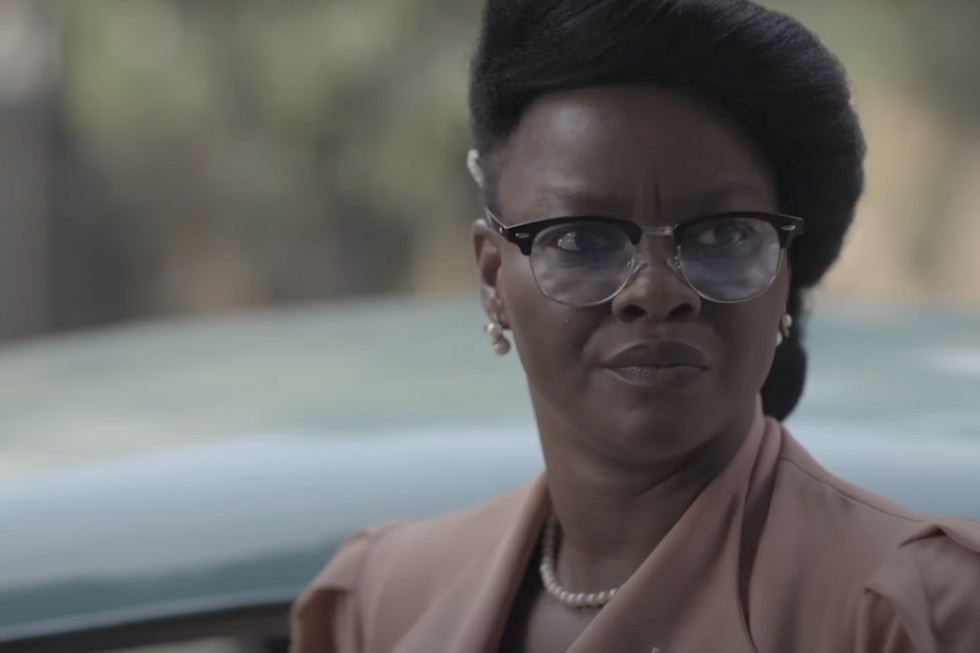In 'Funmilayo Ransome-Kuti,' Bolanle Austen-Peters Presents a Nuanced Story of an Icon
The well-known story about legendary musician Fela Kuti’s mother gets a fresh take in Nigerian director Bolanle Austen-Peters’ latest movie.

A close-up shot of Joke Silva in ‘Funmilayo Ransome-Kuti.’
In the way it is often told, Funmilayo Ransome-Kuti’s legacy can be chalked up to two achievements: she is the first woman in Nigeria to drive a car;and she happens to be the mother of the great Fela Kuti. For the former, she is seen as a ceiling breaker. For the latter, she is considered an instrument of greatness, rarely ever greatness itself, and rarely ever the revolutionary and influential social justice advocate that she was.
In the biopic, directed by Bolanle Asuten-Peters, Ransome-Kuti’s story is given bigger room and quite deservedly, even greater importance. The film, starring recent Africa Magic Viewers’ Choice Awards Best Actress winnerKehinde Bankole, veteran Nollywood actor Joke Silva, Omowumi Dada, Jide Kosoko and others, follows the life of the renowned educator and activist, from childhood to her prime, and then her older years. Her growing curiosity in her early years is juxtaposed with her groundbreaking work as a nationalist. She most notably founded the Abeokuta Women’s Union, which had firm ties with the Nigerian Union of Teachers, and the West African Students’ Union both of which were strong anti-colonialist movements.
Austen-Peters, who runs one of the country’s most vibrant theater productions, brings a lush, affective quality to her direction in this film. This quality raises the stakes and emphasizes the graveness of the different issues Ransome-Kuti found herself fighting against, often by herself. And by focusing on the lesser-known aspects of the Nigerian icon — her work in activism, her strong anti-colonialist views and her unwavering pride in her roots — we come to see a bigger, more impressive picture of a woman whose contributions to weeding out colonialism often go unnoticed.
Ahead of Funmilayo Ransome-Kuti’s cinema release this weekend, OkayAfrica speaks to Austen-Peters who talks about the making of the film and the work that goes into accurately honoring a widely known historical figure. This interview has been edited for length and clarity.
OkayAfrica: How did you approach casting for this film?
Bolanle Austen-Peters: I don't follow popularity as much as I follow the ability to deliver. Kehinde [Bankole], who I had worked with before, was very dedicated. She worked for about six months with me before we shot, going through the emotions and the character, etcetera. The same with Joke [Silva]. I wanted somebody elegant and mature but still comes across as sophisticated. She also embodies that softness and strength.

Bolanle Austen-Peters tried to bring together the different aspect of Funmilayo Ransome-Kuti’s life in the film.
Photo from 'Funmilayo Ransome-Kuti' trailer, YouTube.
What went behind how you structured the timeline of the film?
In telling this story, I needed to balance the different aspects of her life. I [also] needed to move very quickly from her childhood days to when she became an activist. In balancing Funmilayo [Ransome-Kuti]'s life — because she was so varied, she had so many layers — I looked at how I could bring together her modern, sophisticated lifestyle with Funmilayo [Ransome-Kuti] the Nigerian traditionalist, who believed in all things African. So I used the story of the market women and juxtaposed that with that of her elite friends. A lot of us have that complex character and that was what I found astonishing in that movie.
Which of your theater skills did you apply while making this film?
Oh my goodness, if I didn't have theater, I wouldn't be able to do 90 percent of what I do now. Theater taught me the discipline of rigorous rehearsals. So I rehearsed with my actors. I'm not sure every movie director does that. Theater also taught me the rigor of working in production. Being on film sets is tough, but by the discipline from theater, I can be on a movie set all day. But I think the most important things that theater gave me are, one: costuming and set design. I learned how to costume and get all the different color palettes that I want in anything that I do. And then the second thing is directing. I'm an actor's director. I'm able to get into an actor and get them to do what I want them to do because there's no second takes on stage. People have to feel you when they're in the room.

Leading numerous theater productions helped Bolanle Austen-Peters direct “Funmilayo Ransome-Kuti.”
Photo from 'Funmilayo Ransome-Kuti' trailer, YouTube.
What went into accurately building the time in which the story happened? It’s a part of filmmaking Nollywood still struggles with.
It was money. Because everything in Nigeria is modern, we have power lines all over the place, so I could not do a lot of drone shots to start with. But because I wanted some really powerful shots and I didn't have a lot of money, as it was self-funded, I had to do a lot of editing in post-production and that costs a lot as well because of the VFX. In terms of costuming, I had a fantastic team. Plus the Kuti family were very supportive. We used the real house that she lived in. And the British High Commission were also very supportive as we shot in their office in Lagos.
What do you hope people feel while watching this film?
The first is that women in Africa are strong and do extraordinary things. We don't have to wait for others. One person can ignite change. And I think that's probably one of the most important messages in the movie. One woman made all the difference with Wole Soyinka's mom [Grace Eniola Soyinka] as her second in command. Second is that we all must speak up when there is oppression. And another thing for me would be that we should be proud. We have our culture. It's beautiful. Look at our costumes. Look at the political structures we had in place. All in all, it's just a beautiful movie.
- Introducing OkayAfrica's 100 Women 2019 List ›
- Seun Kuti And Nneka Celebrate Incredible Black Women In This New Music Video ›
- Mother Africa: 12 Iconic Women Who Have Shaped Our Culture ›
- Google Honors Nigerian Feminist Icon, Funmilayo Ransome-Kuti, With Doodle ›

